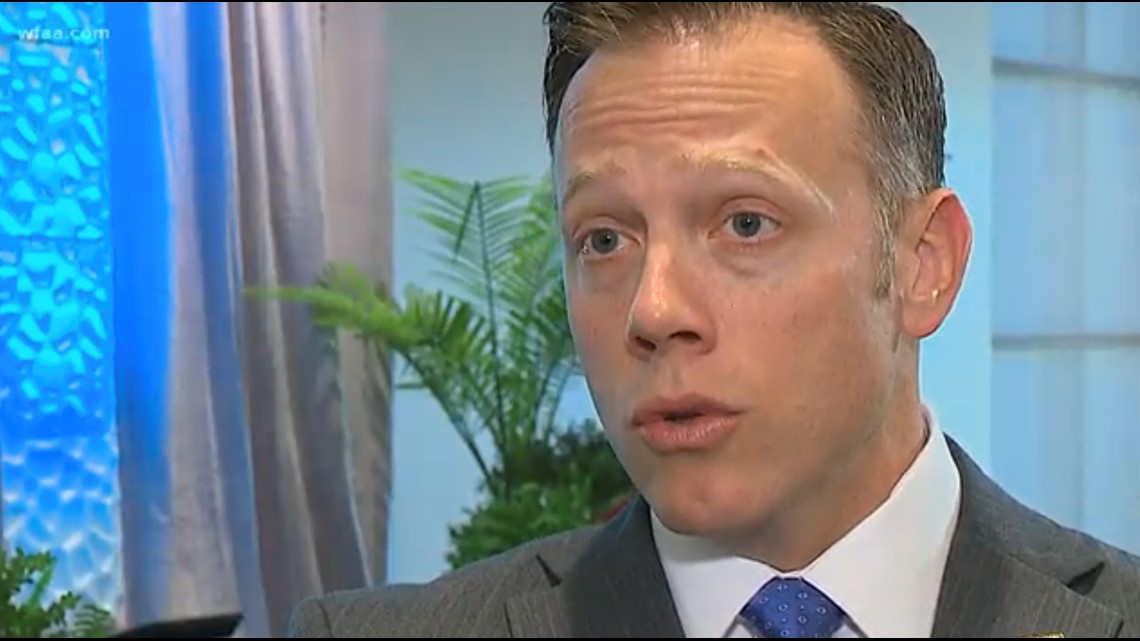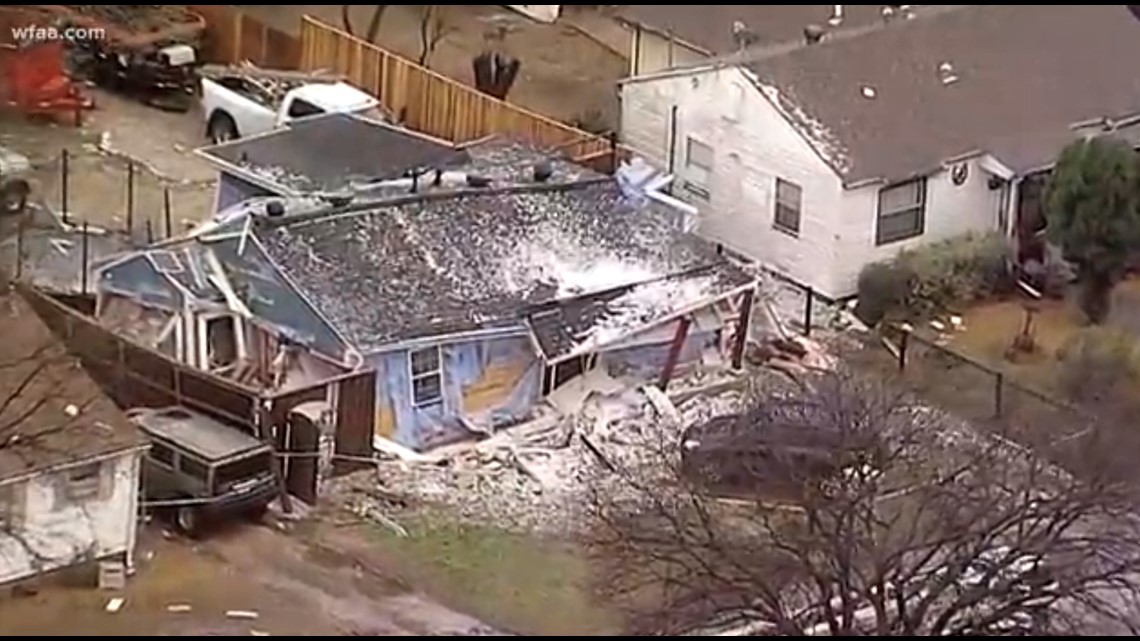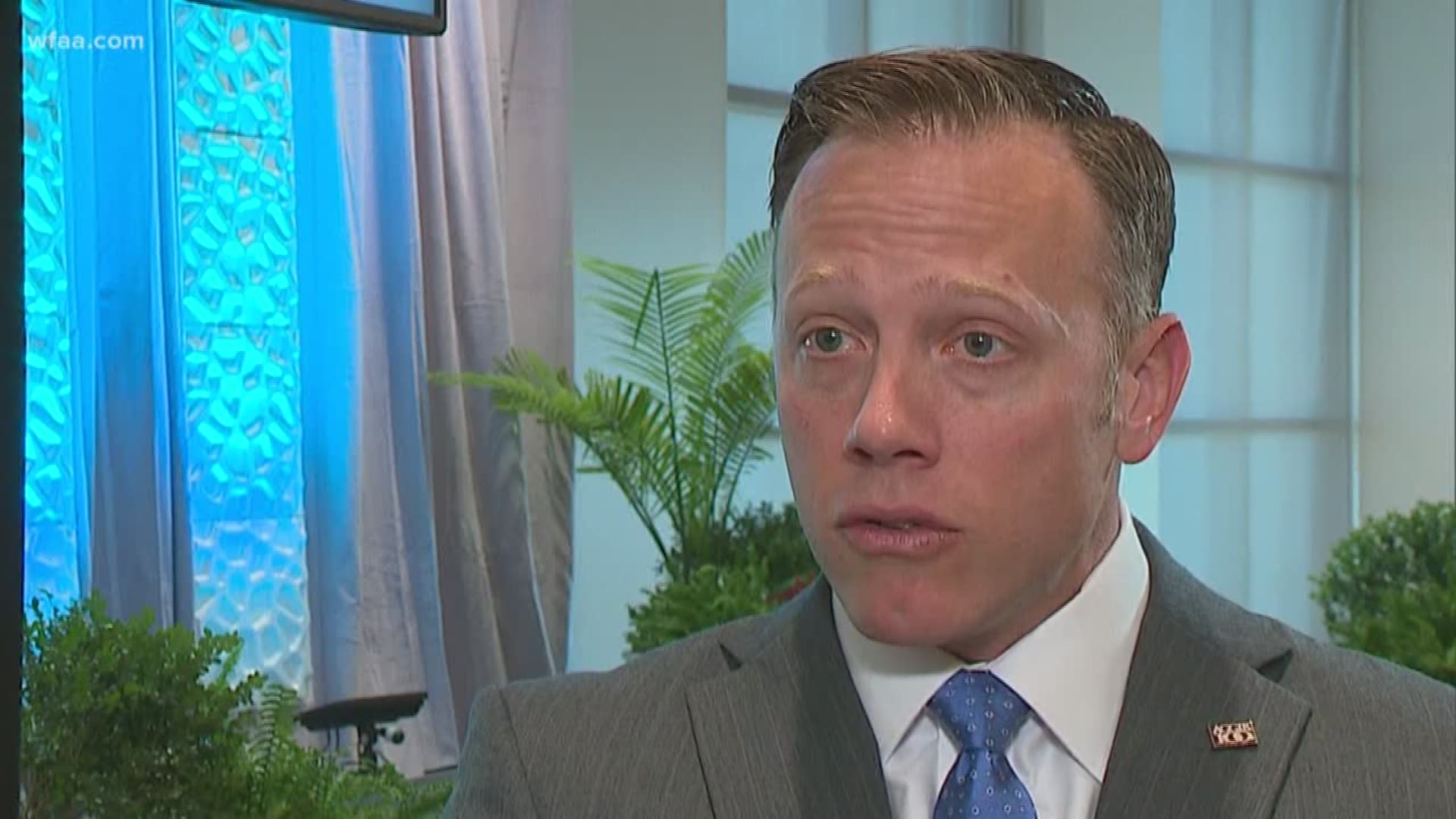WFAA sat down for the first time Friday with Texas Railroad Commissioner Ryan Sitton to talk about the investigation into the February explosion that killed 12-year-old Linda Rogers.
The three-member elected commission regulates pipeline companies like Atmos Energy. The National Transportation Safety Board is continuing its investigation into the events that resulted in the deadly explosion, as well as two other gas-related house explosions one street over.
Atmos has said its experts have determined that heavy flooding, combined with unforeseen shifting geologic formations, led to the massive leaks in Northwest Dallas.
Here's a transcript of our interview with Sitton:
Atmos has said it will be 2023 before they replace all of the aging cast iron in Dallas. Do you think that is an acceptable timeline?
"Yes, and I’m going to qualify that with: these companies do these risk assessments and the risk assessments are mandated by or they follow federal guidelines… So when you look at the priority of replacement it’s not always just cast iron that’s the priority. You could have very safe cast iron lines out there and there may be other things that drive other areas to be the priority. No one wants leaks. They don’t want leaks. The Railroad Commission doesn’t want leaks. The public doesn’t want leaks. And having seen how they do their risk rankings, I assume that that’s probably a good timeline."


Were you surprised by what happened in Northwest Dallas?
"Sure, no one like those things and we have such a good track record of being safe with natural gas distribution systems. Yeah, that’s always surprising when you have an event like that."
Do you think though that they handled it appropriately?
"You know they had two house explosions that were gas-related, and then only after we have this third explosion that kills a young girl, do they evacuate the neighborhood and take decisive action... My understanding is, not knowing all, the specific steps that were taken that they went to pretty extensive steps to put families up in homes, pay for hotels, gave them allowances to make sure that their expenses were covered. Most gas incidents are not related to the pipeline company. Most gas incidents, in general, are related to users that have left a gas event open. So if you had an incident and immediately evacuate a neighborhood over someone who had left their gas line open, you’d disrupt a lot of peoples’ lives. You’d cause a lot of panic over something that had nothing to do with the pipeline. Once again in general, I think they were working hard to follow a process and not raise panic, but as soon as I understand they knew there was a concern issue, they moved very quickly."
But in this case you’d already had two houses that had exploded or caught fire?
"I understand that, but they didn’t know if the first two were related to leaks in the pipeline system, or something that was happening within the home until the time that they made a decision to make a move. They would have raised a lot of panic and disrupted people’s lives without knowing that there was a safety issue related with the lines."
Atmos has said that they have repaired the lines in that area and that everything is OK out there now. Should we take their word for it?
"We all know we can’t ever be a 100 percent certain of anything, but these guys are doing everything they can to make sure that it’s as safe as possible."
Talk to us about the role of the Railroad Commission?
"Our role is to put in place the rules that they have to follow to try to make sure they are as safe as possible. We aren’t pipeline operators. It’s not our job to go out and say 'this line needs to do this, this line needs to do that.' That’s the pipeline companies. But if there are ever issues, then we make sure 'did you follow all of our rules?' We also share some of that jurisdiction with …. PHMSA (Pipeline and Hazardous Materials Safety Administration), which is the federal agency that regulates pipelines. They set the standard for how risk analysis is done. And we in our rules make sure that the local companies follow those rules."


It’s been said by some that the Railroad Commission’s too close to the industry. What would you say to that?
"Well that’s always an easy complaint to try to throw agencies under the bus. The fact is, we are the public’s first connection to this industry, and my job is -- not just as an elected official, but as an engineer who has a state license, and just a person who grew up here in Irving and represents this area -- my job is to make sure that people are safe and we take that job very seriously. And the fact is that we work closely with industry when there’s an incident to learn what happened, to figure out how we can improve. We’re all aligned in this goal that we don’t want incidents and I don’t think that closeness is a problem."
Would you call that characterization unfair then?
"Yes, I think that’s very unfair."
Do you think the Railroad Commission needs to be more proactive in how it regulates companies like Atmos?
"No. I think, in general, our track record has become very good. It’s very safe. Whenever there is an incident, we have to be very quick to respond. We have to be very quick to investigate, to figure out what happened. We have to be quick to communicate with the public and we do have opportunities to improve in how we communicate. In terms of how we regulate, do we need to be more in there... back tracking what they’re doing? I don’t think that would add value. We don’t have the expertise in operating lines. But making sure that our rules are followed, we’re very judicious about that and I think we do a good job."


I’ve had one pipeline safety expert basically tell me that the penalties are so low that the Railroad Commission levies on the industry that it’s sort of the price of doing business.
"That’s a mischaracterization as well because it implies that the only negative impact of not following our rules or having an incident is having a Railroad Commission fine. I could fine millions of dollars, that still would not be as big a negative impact to Atmos as dealing with the public situation and the fact that... look they don't want to have incidents either. It’s a big economic cost to have those. We’re all aligned in that we don’t want incidents and everyone is incentivized not to have incidents. So I think to imply that our fines are somehow the issue is wrong. It’s making sure that our rules are followed and the fines are simply a way to document that."
What do you think the lessons are from what happened in Dallas?
"We need to have a discussion with federal regulators and local regulators to re-examine those risk protocols. I don’t know enough to tell you today because the investigation is still going on whether or not those lessons are but we’ll investigate that and find out if there’s something that we should have known and how would our risk analysis could have caught that earlier."
So when I was looking at campaign contributions last night, I noticed that obviously overwhelmingly most of the contributions are coming from the oil and gas industry. How does that affect how you do your job?
"None. At the end of the day our job is to respond to the public who puts us in these roles. Those are just the resources we need to communicate with the public."
If the final results show that Atmos should have acted sooner, would you re-evaluate some of your thoughts?
"Well, certainly. Once again if you look at the track record overall, natural gas systems in Texas are very, very safe, and so we don’t want to throw the baby out with the bath water. Let’s make sure that if there is a lesson to be learned here, that rules can be changed and let’s do that, but that’s going to take some research and understanding about what the real causes were."

